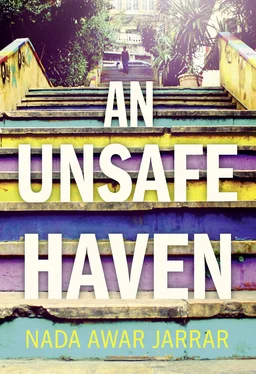AN UNSAFE HAVEN
Nada Awar Jarrar

The Borough Press
An imprint of HarperCollins Publishers
1 London Bridge Street
London SE1 9GF
www.harpercollins.co.uk
Published by HarperCollins Publishers 2016
Nada Awar Jarrar asserts the moral right to be identified as the author of this work
A catalogue record for this book is available from the British Library
First published by HarperCollins Publishers 2016
Cover layout design: Holly Macdonald © HarperCollins Publishers Ltd 2016. Cover photography © Mario Ramadan/EyeEm/Getty Images (steps) and Shutterstock.com(texture)
This novel is entirely a work of fiction. The names, characters and incidents portrayed in it are the work of the author’s imagination. Any resemblance to actual persons, living or dead, events or localities is entirely coincidental.
All rights reserved under International and Pan-American Copyright Conventions. By payment of the required fees, you have been granted the non-exclusive, non-transferable right to access and read the text of this e-book on-screen. No part of this text may be reproduced, transmitted, down-loaded, decompiled, reverse engineered, or stored in or introduced into any information storage and retrieval system, in any form or by any means, whether electronic or mechanical, now known or hereinafter invented, without the express written permission of HarperCollins e-books
Source ISBN: 9780008165017
Ebook Edition ©July 2016 ISBN: 9780008165031
Version: 2016-06-01
For Bassem,
With all my love.
Table of Contents
Cover
Title Page
Copyright
Dedication
Chapter 1
Chapter 2
Chapter 3
Chapter 4
Chapter 5
Chapter 6
Chapter 7
Chapter 8
Chapter 9
Chapter 10
Chapter 11
Chapter 12
Chapter 13
Chapter 14
Chapter 15
Chapter 16
Chapter 17
Chapter 18
Chapter 19
Chapter 20
Chapter 21
Chapter 22
Chapter 23
Chapter 24
Chapter 25
Chapter 26
Chapter 27
Chapter 28
Chapter 29
Chapter 30
Chapter 31
Chapter 32
Chapter 33
About the Author
Also by Nada Awar Jarrar
About the Publisher
They are still on daylight saving and the light, soft and hesitant, comes early, through the gap in the curtains and on to the bed, shaping itself to the contours of their bodies, gently waking her.
Peter does not stir when she sits up. She looks at him, his features in repose beautiful to her, fair skin unblemished, his greying hair fine as silk, an implied calmness to his demeanour even in sleep that still moves her after so many years.
She gets out of bed carefully, puts on her dressing gown and looks back to make sure she has not disturbed him. In the kitchen, Anas is already sitting at the breakfast bar, hair ruffled, his eyes, when he looks up from behind his glasses, uncharacteristically flat.
—Anas, Hannah says quietly. You’re up early.
He does not respond.
She places her hand over his and feels a slight tremor in it.
—Is everything all right?
He squeezes his eyes shut and shakes his head. She puts an arm around his shoulder and, feeling him shudder, realizes that he is crying.
—Anas, please tell me what’s the matter. You’re scaring me.
He finally looks up at her.
—It’s Brigitte, he says in a whisper. She’s left Damascus and taken the children with her.
She lifts both hands to her mouth.
—I don’t understand, she exclaims. Where did they go? What happened?
There is a pause before he can reply.
—I telephoned them several times yesterday but no one was in. I’d been worried since that car bomb exploded in our neighbourhood after I left. I wanted to make sure they were all right, but when I called my mother late last night, thinking they might have gone there, she said they were gone.
—Gone?
A thought occurs to Hannah though she does not say it out loud. Please God they haven’t been kidnapped, she thinks. It is not unusual for people to go missing in Syria. Since the revolution and consequent civil war began, there have been tens of thousands of abductions.
—It’s not what you think. Anas has read her thoughts. Our neighbour downstairs saw the taxi we always use parked outside for them. They had lots of luggage. When my mother asked the driver later, he said he’d taken them to the airport.
—Thank God. She breathes a sigh of relief. Where do you think they went?
—I’m sure she went to her parents in Berlin. Where else would she go?
—So you’re going to call them?
He shakes his head.
—My in-laws moved recently and I don’t have their number. I didn’t think I’d ever need to get in touch with them without Brigitte there.
—At least you know they’re safe, Anas. Hannah is not sure what else she can say in the way of comfort.
—She waited until she knew I’d be coming here for the exhibition and left without saying anything about it. There is bitterness in his reply. She knows I would never have agreed to it.
—Brigitte has talked about leaving before?
He shrugs.
—Since the fighting began, whenever the subject came up. I always told her Damascus is home and I would not abandon it no matter what happened.
He waits for a moment until Hannah begins to feel a hint of his anguish.
—I also said I would never allow the children to leave. I reminded her that they would always be Arab.
—But, Anas, you can’t be surprised that she would want to get the children out of a country at war? Surely, you can’t.
—She doesn’t feel the way I do about Syria, he says. Why should she? After all, it’s not her country.
Hannah begins to ask him if he really believes any mother, regardless of her nationality, would not choose to remove her children from danger, no matter the cause, but decides to remain silent.
She sits down and feels a now familiar hopelessness rising through her chest, gloom that comes from her many years as a journalist writing about the affairs of a region constantly in turmoil. Silently, she gathers together the thoughts that she will later write down to use in the stories she is always working on.
In the past five years, the Arab world has swelled and raged as dictators have fallen and people in their hundreds of thousands have been killed and millions of others displaced. In Syria and in Iraq, in Egypt and Libya, and in the farther reaches of the Arab Gulf, we have looked on in horror while humanity appears to stumble over itself; and Lebanon, in the wake of all this turmoil, teeters on the brink. There are moments when it seems too big, too unfathomable and overwhelming a reality to take on, when I feel as if I – along with the region I once believed in – am moving through mud, fearful and hesitant, unable to take that next step towards release.
Living in Beirut can be deceptive; it offers a false impression of safety and permanence in the midst of all the upheaval. We feel the direct consequences of the tragic events in Syria, but it is hardly by choice. Is Brigitte wrong in distancing herself from what is going on? And are we, all of us, mistaken in standing by, believing ourselves helpless like this?
There is something else to be learned from the experience of this situation, something to do with the conflict’s essential incongruity, even to those of us who are closest to it. Nothing about brutal battles is acceptable, nor are they a normal function of human interaction. This is how people diverge in their perceptions. For the suicide bombers who have been striking in the heart of Beirut or Baghdad, in Benghazi or Sanaa, in heavily populated areas and at times of day when ordinary people are getting on with their lives and the highest number of casualties is likely to occur, for these extremists, there is no such thing as everyday life, nothing in their psyche that points to normality and recognition of the other as legitimate and worthy.
Читать дальше




![Макс Фрай - Nada [сборник litres]](/books/414567/maks-fraj-nada-sbornik-litres-thumb.webp)








